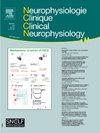Neurophysiology of adaptative and maladaptive stress: Relations with psychology of stress
IF 2.4
4区 医学
Q2 CLINICAL NEUROLOGY
Neurophysiologie Clinique/Clinical Neurophysiology
Pub Date : 2024-12-13
DOI:10.1016/j.neucli.2024.103036
引用次数: 0
Abstract
Objectives
The stress reaction is an integrated response to a change in the environment that enables each individual to adapt to demand. While this response is physiologically coordinated by the brain, its phenomenology is expressed in the field of psychology and psychopathology. This interrelation between neurophysiological mechanisms and psychological processes is complex as dynamic interpersonal, biological, and psychocognitive systems interact with contextual and environmental factors to shape adaptation over the life constraints.
Method
This article aims to present the actors of the adjusted stress response, such as coping and coping flexibility, mindfulness and resilience, and their respective neurophysiology.
Results
A model of the relationship between resilience, mindfulness and coping was proposed for optimizing adaptation to stress response.
Discussion
These focuses are prerequisites for understanding and supporting human adaptation in the everyday environment and promoting efficient management of stress for mental and physical health.
适应性和非适应性应激的神经生理学:与应激心理学的关系。
目的:应激反应是对环境变化的综合反应,使每个个体能够适应需求。虽然这种反应在生理上是由大脑协调的,但其现象学在心理学和精神病理学领域得到了表达。神经生理机制和心理过程之间的相互关系是复杂的,动态的人际、生物和心理认知系统与环境和环境因素相互作用,形成对生活约束的适应。方法:本文旨在介绍调节应激反应的参与者,如应对和应对灵活性、正念和弹性,以及它们各自的神经生理学。结果:建立了心理弹性、正念与应对的关系模型,为优化应激适应提供了理论依据。讨论:这些重点是理解和支持人类适应日常环境以及促进有效管理精神和身体健康压力的先决条件。
本文章由计算机程序翻译,如有差异,请以英文原文为准。
求助全文
约1分钟内获得全文
求助全文
来源期刊
CiteScore
5.20
自引率
3.30%
发文量
55
审稿时长
60 days
期刊介绍:
Neurophysiologie Clinique / Clinical Neurophysiology (NCCN) is the official organ of the French Society of Clinical Neurophysiology (SNCLF). This journal is published 6 times a year, and is aimed at an international readership, with articles written in English. These can take the form of original research papers, comprehensive review articles, viewpoints, short communications, technical notes, editorials or letters to the Editor. The theme is the neurophysiological investigation of central or peripheral nervous system or muscle in healthy humans or patients. The journal focuses on key areas of clinical neurophysiology: electro- or magneto-encephalography, evoked potentials of all modalities, electroneuromyography, sleep, pain, posture, balance, motor control, autonomic nervous system, cognition, invasive and non-invasive neuromodulation, signal processing, bio-engineering, functional imaging.

 求助内容:
求助内容: 应助结果提醒方式:
应助结果提醒方式:


